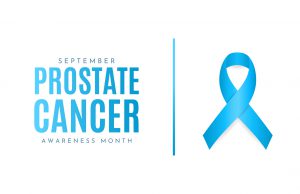 Prostate cancer is the most commonly diagnosed form of cancer and the second leading cancer-related cause of death among people assigned male at birth. The specific causes of prostate cancer are unknown, but certain factors can increase your risk of developing it, such as:
Prostate cancer is the most commonly diagnosed form of cancer and the second leading cancer-related cause of death among people assigned male at birth. The specific causes of prostate cancer are unknown, but certain factors can increase your risk of developing it, such as:
- Age (prostate cancer is most common over the age of 50)
- Race (prostate cancer is more common and more likely to be aggressive among Black men)
- Family history (having a father, brother, or child with prostate cancer may increase your risk)
- Obesity (prostate cancer is more likely to be aggressive and to return after treatment among people who are obese)
Prostate cancer may not present any symptoms, particularly in its early stages. When symptoms are present, they may include:
- Difficult, painful, and/or more frequent urination
- Blood in urine or semen
- Difficulty getting or maintaining an erection
- Painful ejaculation
- Pain or stiffness in the lower back, hips, pelvis, and upper thighs
- Unintended weight loss
There are two screening tests available for prostate cancer: a digital rectal exam (DRE) and prostate-specific antigen (PSA) test. To perform a digital rectal exam, your doctor inserts a gloved finger a few inches into your rectum to check your prostate gland. A prostate-specific antigen test is a blood test that checks for elevated levels of PSA in your blood; aside from prostate cancer, this test can also indicate less serious issues such as prostate enlargement or infection.
Your doctor may recommend additional tests to diagnose cancer, such as an ultrasound and/or biopsy of the prostate. A prostate ultrasound involves a small probing device, approximately the size of a finger, being placed into your rectum; this device creates sound waves that bounce off of your organs and create an image that allows your doctor to view the size, shape, and location of your prostate gland. A prostate biopsy involves removing a small piece of the prostate to look for abnormal cells.
Treatment of prostate cancer depends factors such as your age, your overall health, and the growth and spread of the cancer at the time of diagnosis. Common treatment options include watchful waiting or expectant management (regularly checking for new signs or symptoms), radiation therapy (high-energy x-rays used to kill cancer cells), chemotherapy, surgery (having the prostate gland removed), and hormone therapy.
You can schedule an appointment with a urologist at Jamaica Hospital Medical Center for a prostate cancer screening or to discuss treatment options. To schedule an appointment, please call (718) 206-7001.
All content of this newsletter is intended for general information purposes only and is not intended or implied to be a substitute for professional medical advice, diagnosis or treatment. Please consult a medical professional before adopting any of the suggestions on this page. You must never disregard professional medical advice or delay seeking medical treatment based upon any content of this newsletter. PROMPTLY CONSULT YOUR PHYSICIAN OR CALL 911 IF YOU BELIEVE YOU HAVE A MEDICAL EMERGENCY.
